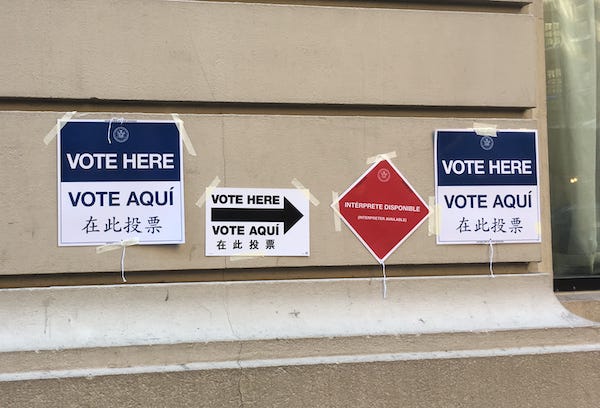Judicial Notice (11.03.24): Judgment Day
A big win for Kirkland and Covington, district judges going rogue, a major circuit split, and a potentially consequential partner departure.
This post is sponsored by
ShareFile helps legal professionals like you deliver modern client experiences with secure, digital workflow technology that is easy to use and made to fit your firm’s unique needs. Designed to simplify workflows and improve collaboration, ShareFile works with your existing technologies and provides added visibility, speed, and efficiency, without sacrificing security. Learn more about ShareFile.
I hope everyone had a safe and enjoyable Halloween. Here in the Lat-Shemtob household, Harlan dressed up as a pirate, while Chase got stuffed into a Tigger costume. While they weren’t particularly creative—unlike some of the entrants in the Southern District of New York’s Halloween costume contest, the subject of this fun Wall Street Journal piece (gift link) by Corinne Ramey—the boys looked pretty darn cute (if I do say so myself).
At any house where Harlan confronted a choice of treats, he agonized over his decision, as if he were picking a Supreme Court justice. But his decision paralysis was probably a good thing in the end: it made him a very inefficient trick-or-treater, thereby reducing his candy haul. And if there’s one thing an already energetic, seven-year-old boy doesn’t need, it’s more candy.
Now, on to the news.
Lawyers of the Week: Rebecca Fitzpatrick, Sierra Elizabeth, Phyllis Jones, Sherry Knutson, and Charissa Walker.
Defending giant corporations in product-liability cases isn’t easy—especially when plaintiffs’ lawyers present juries with heartbreaking stories of unfathomable losses. Earlier this year, Abbott Laboratories and Mead Johnson went to trial to defend against allegations that their specialized formulas for premature babies cause necrotizing enterocolitis, a debilitating intestinal disease with an estimated mortality rate of more than 20 percent. The first two trials did not end well for Abbott and Mead, which were hit with verdicts of $495 million and $60 million, respectively.
But on Thursday, a third trial, held in the 22nd Judicial Circuit of Missouri (St. Louis), brought better news for the companies. Abbott and Mead were sued for $277 million in compensatory damages and $6 billion in punitive damages, based on theories of product defect, failure to warn, and negligence—and found liable on none. The trial lasted five weeks; the jury deliberated for three hours.
The companies still face around 1,000 similar lawsuits across the country, so their legal woes are far from over. Abbott CEO Robert Ford said that as a result of the litigation, his company might stop selling their preemie formula, which generates only $9 million a year in revenue—a prospect that has doctors in neonatal intensive care units in a state of “genuine panic,” according to Jonathan Davis, chief of the division of newborn medicine at Tufts Children’s Hospital.
For now, however, the defense verdict in Whitfield v. Abbott is a big win for Abbott and Reckitt, Mead Johnson’s parent—whose share prices rose significantly after the news. And it’s a big win for the five women lawyers who led the successful trial teams: Rebecca Fitzpatrick and Sierra Elizabeth of Kirkland & Ellis, who represented Abbott, and Phyllis Jones of Covington & Burling, who represented Mead Johnson together with Sherry Knutson and Charissa Walker of Tucker Ellis.
And Fitzpatrick and Elizabeth had to overcome another challenge as well. On October 24, Judge Michael Noble sanctioned their partner James Hurst, concluding that he tried to violate certain court orders related to evidence and arguments to the jury, and barred Hurst from presenting evidence or closing argument for the rest of the trial. The sidelining of Jim Hurst, a top trial lawyer, was surely an unwelcome development for the K&E team—but didn’t prevent them from prevailing in the end.
Other lawyers in the news:
Congratulations are in order for Andrew Goldstein—whose name might ring a bell from his role as a top deputy on the Mueller investigation—and Russell Capone. The two former federal prosecutors, now partners at Cooley, secured a non-prison sentence for Nishad Singh, former chief engineer of FTX, the defunct cryptocurrency exchange.
And kudos also to David Boies of Boies Schiller Flexner, who will be honored later this month as one of The American Lawyer’s 2024 Lifetime Achievement honorees—the occasion for this profile by Ross Todd.
The 2024 election is upon us, but bad actors from four years ago are still suffering the consequences of their misdeeds. Kenneth Chesebro, the Harvard Law graduate who played a key role in the “false electors” plot to keep Donald Trump in office, was indefinitely suspended from practicing law in New York. And Rudy Giuliani, previously disbarred in New York for his own election-related misconduct, must surrender some valuable and colorful assets—including a ten-room, luxury co-op on Manhattan’s Upper East Side, a vintage Mercedes convertible once owned by Lauren Bacall, and Joe DiMaggio’s No. 5 Yankees jersey—to Ruby Freeman and Shaye Moss, two Georgia election-poll workers who secured a $148 million defamation judgment against him.
Judges of the Week: Chief Judge Patrick J. Schiltz and Judge Mark Pittman.
When a trial judge has a strong belief that the law requires a certain result in a particular case, but appellate judges reviewing the decisions of that trial judge hold a clearly contrary view, how should the trial judge proceed? Two recent cases offer us the opportunity to explore this question.
Keep reading with a 7-day free trial
Subscribe to Original Jurisdiction to keep reading this post and get 7 days of free access to the full post archives.





